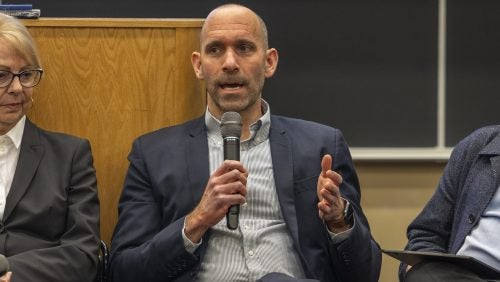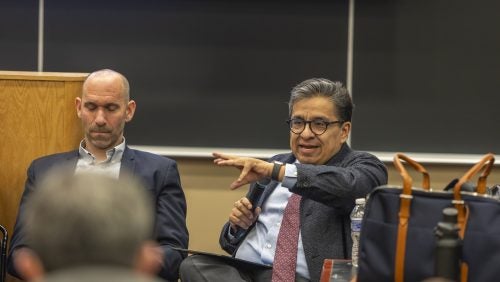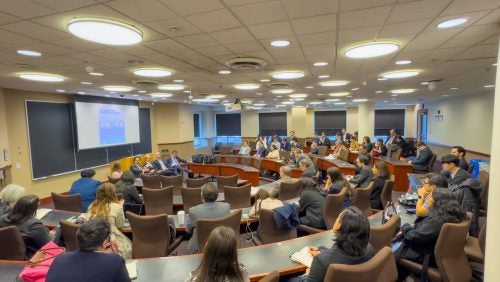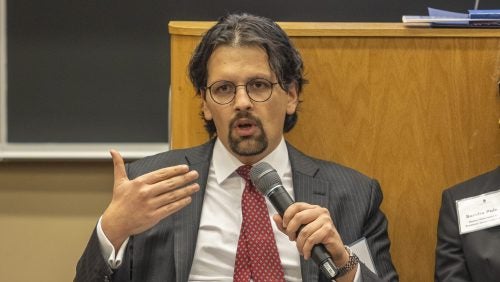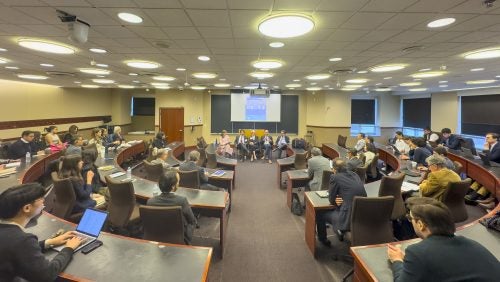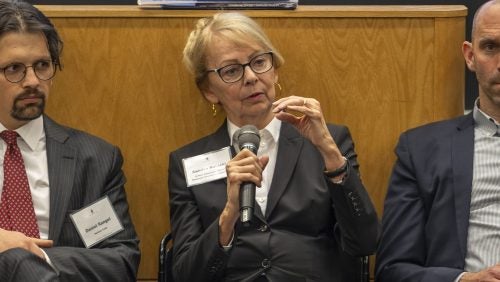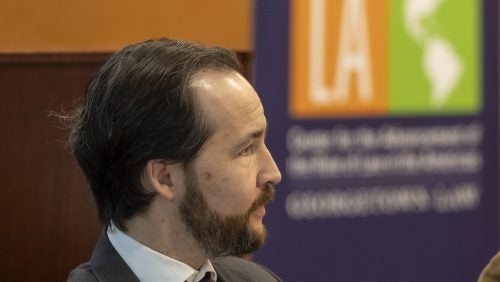USMCA Rapid Response Labor Mechanism
The Rapid Response Mechanism Forum
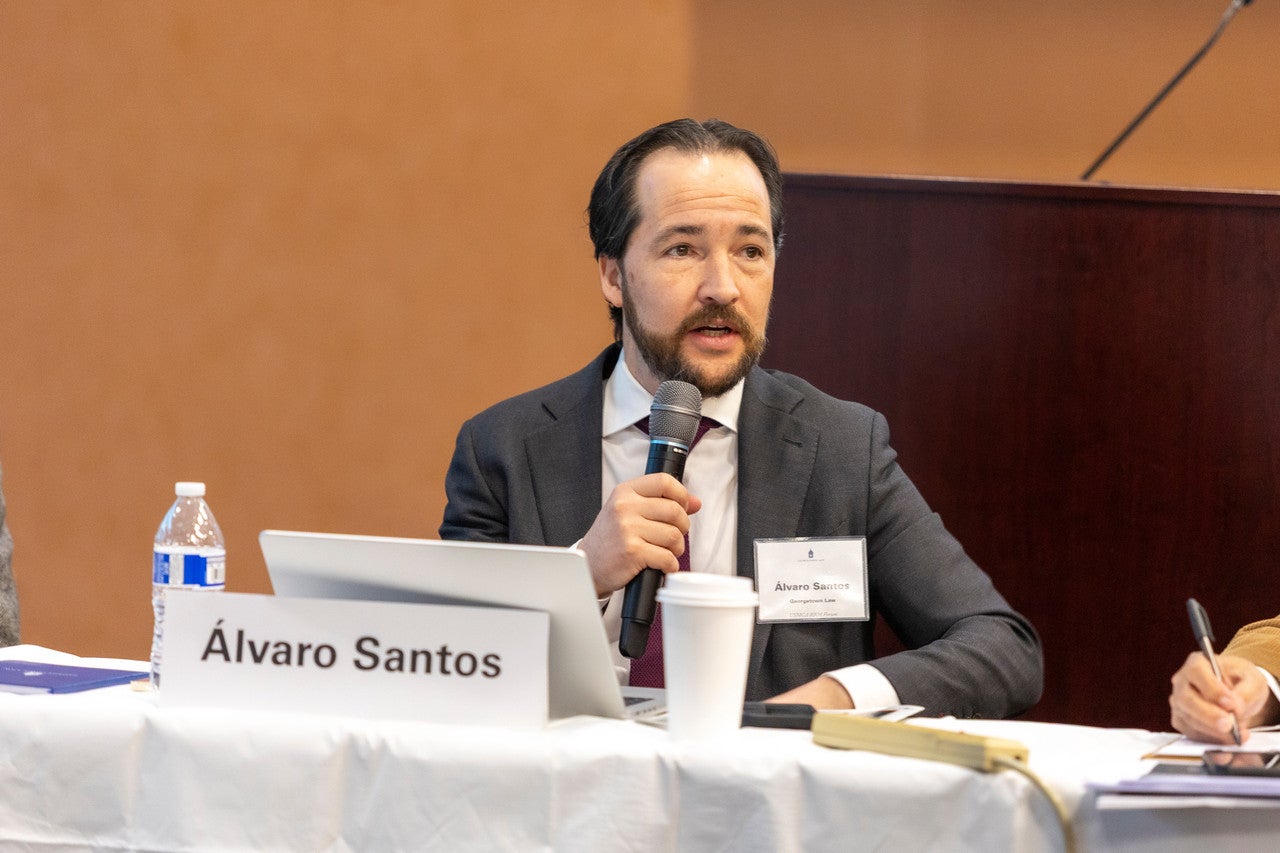
On March 28, 2025, the Center for the Advancement of the Rule of Law in the Americas (CAROLA) and the Institute of International Economic Law (IIEL), in collaboration with El Colegio de México, hosted a timely and engaging conference at Georgetown Law focused on the United States-Mexico-Canada Agreement’s (USMCA) Rapid Response Labor Mechanism (RRM). The event gathered experts from academia, labor, business, NGOs, and the public sector to discuss the tool’s effectiveness and potential improvements.
The event commenced with a private roundtable conducted under the Chatham House Rule, followed by a public panel discussion. Below is a summary of the meetings.

The Rapid Response Mechanism: Assessment and Recommendations for Reform
The discussions in the private roundtable covered a wide range of topics, including the RRM’s role in addressing labor violations, its impact on unionization and workplace conditions, and its evolving procedural complexity. Participants debated whether the Mechanism has fulfilled both its legal and broader social objectives, and whether it risks becoming overly burdensome. Broader policy concerns were also raised, such as the need to strike a better balance between protecting worker rights and ensuring procedural fairness, and to ensure greater transparency and access for all stakeholders. As the USMCA review approaches, the meeting underscored the need for thoughtful reform that reinforces the credibility and utility of the mechanism going forward.

Convened ahead of the upcoming review of the USMCA, the meeting served as a space to identify key lessons learned from past RRM cases and explore possible adjustments to the mechanism in light of its performance to date.
The USMCA Rapid Response Mechanism: Protecting Labor Rights in North America

The panel featured a terrific line-up of speakers with expertise on the RRM and trade and labor matters, including:
- Daniel Rangel, Research Director at Rethink Trade
- Sandra Polaski, Senior Fellow of the Global Economic Governance Initiative at Boston University
- Josh Kagan, Special Counsel at Kelley Drye & Warren LLP
- Ricardo Ramírez Hernández, Founding Partner at RRH Consultores
- Moderated by Professor Kathleen Claussen, Georgetown Law
Josh Kagan opened the conversation by highlighting the Biden administration’s emphasis on a worker-centered trade policy. He pointed to concrete outcomes already achieved through the RRM, such as the reinstatement of wrongfully terminated workers, increases in wages, and enhanced collective bargaining protections in Mexico. At the same time, he raised concerns about recent budget cuts at the U.S. Department of Labor, warning that reduced resources could slow enforcement and weaken future progress on labor rights.

Ricardo Ramírez discussed Mexico’s initial skepticism toward the Mechanism, particularly the fear that the Mechanism could infringe on national sovereignty. Over time, however, he noted that Mexico has taken a constructive approach in responding to RRM cases, leading to notable advances in the enforcement of labor standards. He also flagged several persistent issues, including ambiguous legal definitions, procedural uncertainties, and the asymmetry of the Mechanism’s application across countries.
Daniel Rangel offered a perspective rooted in advocacy, citing several impactful RRM cases that resulted in tangible improvements for Mexican workers, particularly in the context of union-busting, wage suppression, and corrupt employer practices. Still, he emphasized the limitations that remain, especially the lack of adequate remedies for repeat violations, a lack of transparency in decision-making, and the limited participation of workers in crafting remediation plans.
Sandra Polaski praised the RRM’s innovative, case-specific approach, contrasting it with the slower, more state-centered enforcement models used in previous trade agreements. She argued that while the Mechanism represents a major leap forward, its panel phase has become overly formalistic and judicialized, undermining the urgency that the mechanism was designed to deliver. She called for procedural reforms to restore the speed and clarity of response.
As the discussion came to an end, speakers recognized the challenges but shared hope for what could be achieved moving forward. While acknowledging the RRM’s limitations, they affirmed its importance as a pioneering step toward stronger labor rights enforcement and corporate accountability in the region. They called for continued improvements, including more transparency, procedural clarity, and a more balanced application between the U.S. and Mexico to ensure the mechanism can live up to its full potential. The discussion underscored the critical role of labor rights in shaping a fairer and more inclusive model of trade under the USMCA.
You can see the full panel discussion here.

